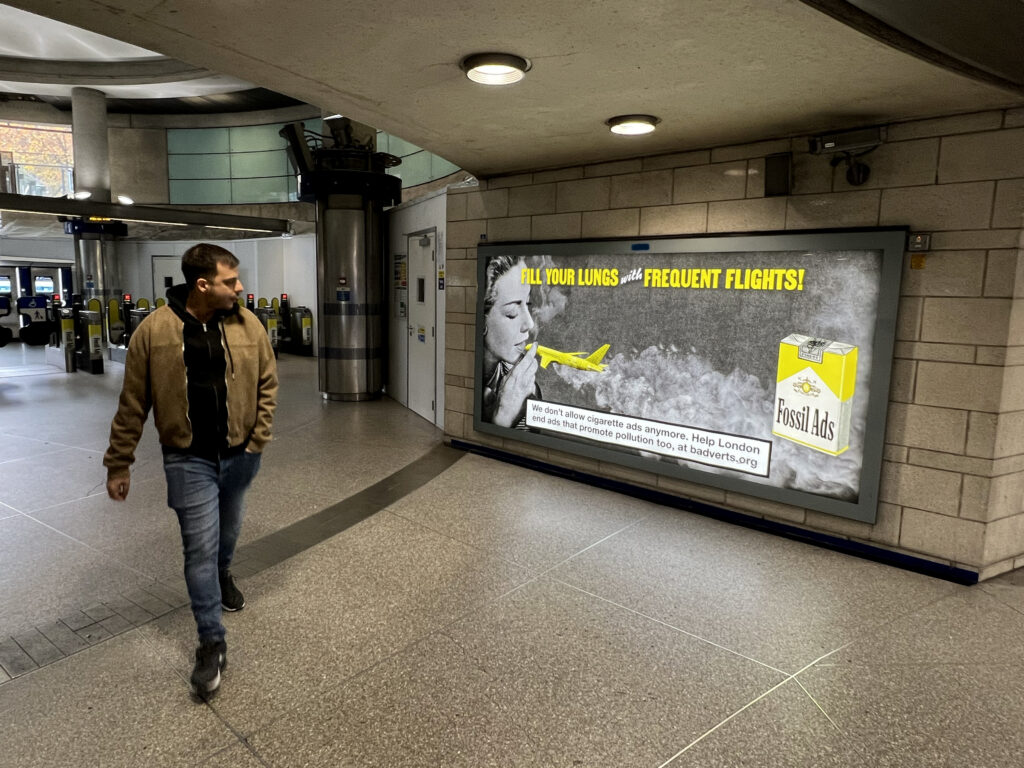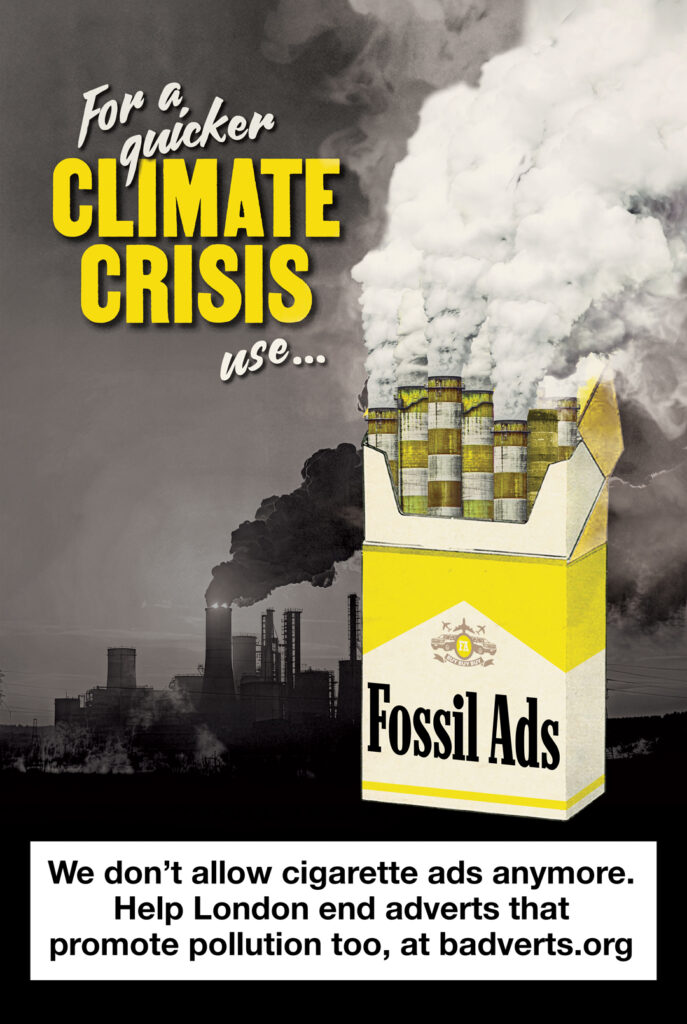Call to stop promoting pollution on London’s transport system.
If someone saw a cigarette advert on London’s transport they would be shocked. But travellers are surrounded by adverts for high carbon, heavily polluting products, companies and lifestyles.
The air pollution alone from burning fossil fuels kills about as many as tobacco, and the ads promote the flights and SUVs that burn the fuel.

Action: Call on the Mayor of London, Sadiq Khan, to end ads promoting pollution on London’s transport
With a world accelerating towards climate collapse, and an international agreement in place meant to stop it, why are there still adverts all around us promoting the pollution that makes it worse. If you don’t feel baffled, you should.
Capital
That’s why the Badvertising campaign has borrowed a communication technique called ‘station domination’ – used in the past by oil companies for influencing and greenwash.
This is being used to call on one of the world’s biggest advertising estates – the London transport network, with close to 10 million passenger journeys per day – to drop ads for oil companies, frequent flights and SUVs.
Campaigners are highlighting London because here the anomaly is acute.
The Mayor of London, Sadiq Khan, who has authority over Transport for London, is a leading advocate for climate action and reducing air pollution in London.
He authored the book Breathe: Tackling the Climate Emergency, and in 2018 launched the London Environment Strategy (LES) committing to achieving net zero for the capital initially by 2050, a target then brought forward to 2030, as well as reducing pollution and improving air quality.
Carbon-intensive
The strategy includes TfL leading by example on environmental objectives.
The campaign also comes in response to a 2024 Desmog report, which revealed how huge polluters – including BP, Shell, SSE, British Gas, EDF, and Offshore Energies UK – placed targeted ad campaigns at Westminster or St. James’s Park tube stations.
we urge TfL to act responsibly and coherently and ambitiously – in its advertising too.
These stations have a high footfall of politicians, political advisors, and civil servants, and multiple campaigns used the ‘station domination’ tactic, which typically includes at least 28 posters and a branded takeover of all ticket barriers.
In keeping with tradition, Badvertising has taken over Southwark station, the closest to Transport for London’s main offices, Palestra House.
The action coincides with the C40 World Mayors’ Conference in Rio, urging city leaders to act as examples of climate leadership. The C40 cities network, which the Mayor is currently co-chairing, promotes guidance for its members on why and how to restrict carbon-intensive advertising in cities.
Ground-breaking
The ‘station’ domination will also overlap with the international climate negotiations, COP30, set to take place in Brazil.
TfL already has a precedent, as a junk food advertising ban was introduced in 2019. Analysis from the University of Sheffield and the London School of Hygiene & Tropical Medicine found that the ban directly led to 94,867 fewer cases of obesity than expected, alongside 2,857 fewer cases of diabetes, and 1,915 fewer cases of cardiovascular disease.
Campaigners argue a high carbon ad ban would have an even larger impact. A 2025 report from the Royal College of Physicians found that air pollution contributed to 30,000 deaths in the UK in 2025 and cost the UK upwards of £27 billion annually – and may be as much as £50 billion when wider impacts, such as dementia, are accounted for.
The Mayor himself, when asked about the junk food ad ban said: “The ground-breaking restrictions we introduced could not only influence behaviour and ultimately save lives but could directly save our NHS hundreds of millions of pounds.” It’s time for the same to be applied to major polluters.

Implementing
Badvertising’s creative director Leo Murray told The Ecologist: “At a time when lesser politicians are trying to pretend away the escalating climate crisis, it is fantastic to see our Mayor providing global leadership on this issue in Rio in the run up to this year’s UN climate summit.
“But back here at home, London’s buses, tubes and trains are being used to push us to burn more fossil fuels.
“Marketing by major corporate polluters creates headwinds that threaten to push us off course to our net zero targets, but as the ultimate boss of Transport for London, the Mayor has the power to stop these headwinds on London’s transport networks today if he chooses.”
London would not be the first city to do this – in the UK, Edinburgh and Sheffield have already joined transport systems and world cities such as The Hague, Stockholm and Toronto in implementing fossil-ad bans on their transport networks.
Undermine
But London would be by far the most influential place in the world to say goodbye to the promotion of pollution for profit on its advertising estate, sending a powerful global signal to other Mayors and paving the way for fossil ad controls to become the norm in progressive cities worldwide.
Jemima Hartshorn, founder and director Mums for Lungs, said:
“I’m excited to see this campaign. As global heating targets have been missed and thousands suffer because of hurricanes, and closer to home, in London, thousands of lives are lost every year to air pollution, we urge TfL to act responsibly and coherently and ambitiously – in its advertising too.
“Fossil fuels, diesel, SUVs and wood burning need to be phased out in London, for our children and grandchildren. There is no place in London for their promotion.”
We don’t allow ads for cigarettes anymore. Now, unless London’s advertising policies align with its clean air and climate commitments, they will undermine them at huge cost. The Mayor has a chance to save lives, lead the world by ending ads that promote pollution, and join other cities already taking the step.
This article first appeared at The Ecologist, written by Andrew Simms for the Badvertising Campaign












